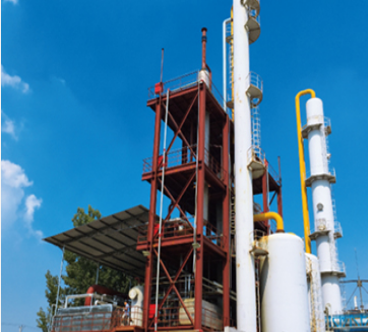一般來說,對于以產甲烷為主要目的的厭氧過程要求pH值在6.5~8.0之間,廢水堿度偏低或運行負荷過高時,會引起反應器內揮發酸積累,導致產甲烷菌活力喪失而產酸菌大量繁殖,持續過久時,會導致產甲烷菌活力喪失殆盡而產乙酸菌大量繁殖,引起反應器系統的“酸化”。嚴重酸化發生后,反應器難以恢復至原有狀態。
Generally speaking, for the anaerobic process with the main purpose of methanogenesis, the pH value is required to be between 6.5 and 8.0. When the wastewater alkalinity is low or the operation load is too high, it will cause the accumulation of volatile acid in the reactor, resulting in the loss of methanogenic bacteria activity and the proliferation of acidogenic bacteria. If it continues for too long, it will cause the loss of methanogenic bacteria activity and the proliferation of acetic acid producing bacteria, causing the degradation of the reactor system“ Acidification ". After serious acidification, it is difficult for the reactor to return to its original state.
“酸化”:①沼氣產量下降;②沼氣中甲烷含量降低;③消化液VFA增高;④有機物去除率下降;⑤消化液pH值下降;⑥碳酸鹽堿度與總堿度之間的差值明顯增加;⑦洗出的顆粒污泥顏色變淺沒有光澤;⑧反應器出水產生明顯異味;⑨ORP(氧化還原電位)值上升等。
"Acidification": ① decrease of biogas production; ② decrease of methane content in biogas; ③ increase of VFA in digested liquid; ④ decrease of organic matter removal rate; ⑤ decrease of pH value of digested liquid; ⑥ obvious increase of difference between carbonate alkalinity and total alkalinity; ⑦ lightening and tarnishing of washed granular sludge; Ⅷ obvious peculiar smell in reactor effluent; Ⅸ increase of ORP value, etc.
厭氧反應器酸化的原因
Causes of acidification in anaerobic reactor
1、厭氧反應器超負荷運行
1. Overload operation of anaerobic reactor
我們都知道,在運行厭氧反應器的各項工藝控制條件中,污泥負荷是一個非常重要的控制參數。污泥負荷是指單位時間內施加給單位質量厭氧污泥的有機物的量,以kgSCOD/kgVS.d表示。對于某種廢水,厭氧污泥具有一個限制值,當運行的負荷超過該限制值,則意味著超負荷運行。
As we all know, sludge load is a very important control parameter in various process control conditions of anaerobic reactor. Sludge load refers to the amount of organic matter applied to anaerobic sludge per unit mass in unit time, expressed in kgscod / kgvs. D. For a certain wastewater, anaerobic sludge has a limit value. When the operating load exceeds the limit value, it means overload operation.
雖然該限制值從污泥負荷的概念上理解是針對整個厭氧污泥,實際上真正的對象是針對厭氧污泥中的產甲烷菌。超負荷運行,實際上就是負荷量超過了厭氧污泥中產甲烷菌的產甲烷能力,而此時的負荷量往往并沒有超過厭氧污泥的水解酸化能力。所以就出現了反應器的VFA開始累積,濃度不斷上升,出水pH值降低,去除效率下降這種污泥酸化現象的發生。
Although the limit value from the concept of sludge load is for the whole anaerobic sludge, in fact, the real object is for methanogens in anaerobic sludge. In fact, overload operation means that the load exceeds the methanogenic capacity of methanogens in anaerobic sludge, while the load does not exceed the hydrolytic acidification capacity of anaerobic sludge. So the VFA of the reactor began to accumulate, the concentration increased, the pH value of the effluent decreased, and the removal efficiency decreased.
所以,了解厭氧反應器的污泥總量,并以此來維持合理的運行負荷,是預防厭氧反應器出現酸化的重要手段之一。
Therefore, understanding the total amount of sludge in anaerobic reactor and maintaining reasonable operation load is one of the important means to prevent acidification in anaerobic reactor.
2、pH值、溫度等運行控制條件出現嚴重偏差
2. Serious deviation occurred in pH value, temperature and other operation control conditions
由于厭氧污泥中產甲烷菌對其生存條件的要求比水解酸化菌苛刻的多,所以當反應器的pH值或溫度的控制范圍出現很大的偏差,就會使產甲烷菌的產甲烷能力受到嚴重影響,而水解酸化菌所受到的影響卻遠遠小于產甲烷菌,其結果同樣會導致厭氧反應器發生酸化現象。
Because the requirements of anaerobic sludge methanogens on their living conditions are much more stringent than those of hydrolytic acidification bacteria, when the pH value or temperature control range of the reactor deviates greatly, the methanogenic ability of methanogens will be seriously affected, while the influence of hydrolytic acidification bacteria is far less than that of methanogens, which will also lead to the acidification of anaerobic reactor Elephant.

3、毒性物質流入
3. Inflow of toxic substances
厭氧污泥相比與好氧活性污泥,更容易受到毒性物質的抑制。和上述兩點所闡明的一樣,事實上更容易受到毒性物質抑制的也是厭氧污泥中的產甲烷菌而非水解酸化菌。當廢水中含有某種或多種毒性物質,其濃度還不足以嚴重抑制厭氧污泥中的水解酸化菌時,產甲烷菌就已經受到抑制,污泥酸化現象就隨之發生。
Compared with aerobic activated sludge, anaerobic sludge is more easily inhibited by toxic substances. In fact, methanogens in anaerobic sludge are more susceptible to toxic substances than hydrolytic Acidifiers. When the wastewater contains some or more toxic substances, the concentration of which is not enough to seriously inhibit the hydrolysis acidification bacteria in anaerobic sludge, the methanogens have been inhibited, and the sludge acidification phenomenon will occur.
因此,應對污染源可能存在的毒性抑制物進行排查,并建立污染物排放源和污水站之間的事故排放通報機制,和潛在的毒性物質日常監測機制,是防止此類厭氧反應器酸化事故的有效應對措施。
Therefore, it is an effective measure to investigate the toxic inhibitors that may exist in the pollution source, establish the accident discharge notification mechanism between the pollutant discharge source and the sewage station, and establish the daily monitoring mechanism of potential toxic substances.
4、營養鹽投加嚴重不足
4. There is a serious shortage of nutrients
對于某些缺乏諸如N、P或其他微量元素的廢水,投加足量的營養鹽非常必要。因為厭氧污泥中無論是產甲烷菌還是水解酸化菌,都需要這些元素進行新陳代謝以及合成細胞物質。
It is necessary to add enough nutrients to some waste water which lacks n, P or other trace elements. Both methanogens and hydrolytic Acidifiers need these elements to metabolize and synthesize cell substances in anaerobic sludge.
當廢水中的某種或多種營養元素缺乏時,將會嚴重影響產甲烷菌的活性。這是因為,對厭氧污泥,尤其是厭氧顆粒污泥來說,產甲烷菌位于顆粒污泥的部位,水解酸化菌則包裹在產甲烷菌的外圍,水解酸化菌較產甲烷菌更容易獲得這些元素來進行新陳代謝,再加之水解酸化菌的生殖速率又遠遠高于產甲烷菌,使得廢水中原本不足的營養元素被水解酸化菌利用殆盡,而產甲烷菌得不到這些必要的元素進行生命活動,其活性會受到很大的抑制。其結果是,反應器的酸化不可避免。
The activity of methanogens will be seriously affected when one or more nutrients are deficient in wastewater. This is because for anaerobic sludge, especially for anaerobic granular sludge, methanogens are located in the center of granular sludge, while hydrolytic acidification bacteria are wrapped around methanogens. Hydrolytic acidification bacteria are more likely to obtain these elements for metabolism than methanogens. In addition, the reproductive rate of hydrolytic acidification bacteria is much higher than methanogens, which makes the waste water insufficient The nutrient elements are used up by hydrolytic acidification bacteria, but the activity of methanogens will be greatly inhibited if they can not get these essential elements for life activities. As a result, acidification of the reactor is inevitable.
酸化”恢復措施
Recovery measures of acidification
1、降低負荷
1. Reduce the load
反應器發生“酸化”的主要原因是產甲烷菌被抑制,而厭氧反應器的容積負荷是由污泥負荷決定的,甲烷菌活性降低,直接反映了污泥負荷的下降。所以在發生“酸化”時應及時控制進水,情況嚴重時應完全停止進水。
The main reason of "acidification" is the inhibition of methanogens. The volume load of anaerobic reactor is determined by the sludge load. The decrease of methanogens activity directly reflects the decrease of sludge load. Therefore, the influent should be controlled in time when acidification occurs, and the influent should be stopped completely when the situation is serious.
2、投加堿度
2. Adding alkalinity
厭氧反應器“酸化”時,可以向反應器中投加堿度中和過高的VFA來維持pH值的穩定,保證產甲烷菌的生存環境,防止嚴重“酸化”。NaHCO3、Na2CO3、NaOH、Ca(OH)2等都是常用來調節堿度的化學藥劑,雖然投加NaOH或者Ca(OH)2等強堿性物質能夠快速提高反應器內的pH值,但是氫氧化物會消耗產甲烷過程中所需的CO2,破壞產甲烷的進行,對產甲烷菌的恢復不利,因此不宜采用NaOH和Ca(OH)2。
When the anaerobic reactor is acidified, VFA with high alkalinity neutralization can be added to the reactor to maintain the stability of pH value, ensure the living environment of methanogens and prevent serious acidification. NaHCO3, Na2CO3, NaOH, Ca (OH) 2 are commonly used to adjust the alkalinity of the chemical agents. Although the addition of NaOH or Ca (OH) 2 and other strong alkaline substances can quickly improve the pH value in the reactor, but the hydroxide will consume the CO2 required in the process of methanogenesis, destroy the process of methanogenesis, and is not conducive to the recovery of methanogenic bacteria, so NaOH and Ca (OH) 2 should not be used.
